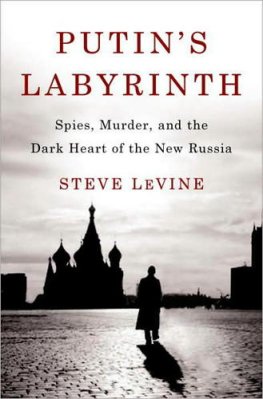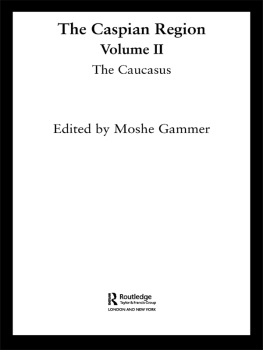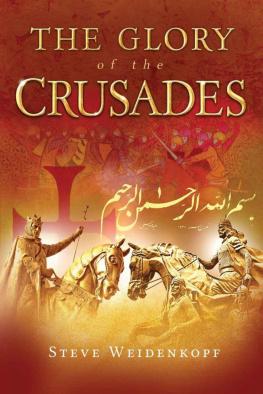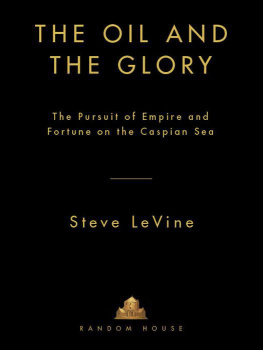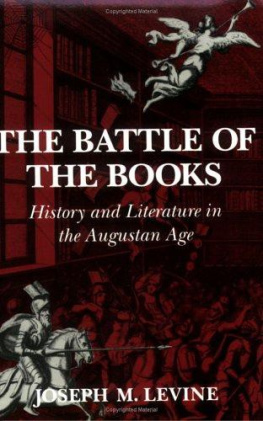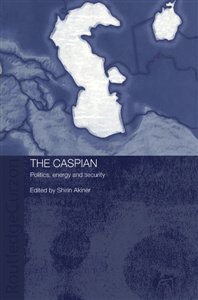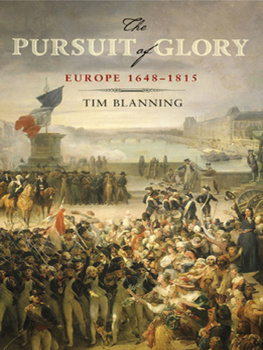Steve LeVine - The oil and the glory: the pursuit of empire and fortune on the Caspian Sea
Here you can read online Steve LeVine - The oil and the glory: the pursuit of empire and fortune on the Caspian Sea full text of the book (entire story) in english for free. Download pdf and epub, get meaning, cover and reviews about this ebook. year: 2007, publisher: Random House, genre: Non-fiction. Description of the work, (preface) as well as reviews are available. Best literature library LitArk.com created for fans of good reading and offers a wide selection of genres:
Romance novel
Science fiction
Adventure
Detective
Science
History
Home and family
Prose
Art
Politics
Computer
Non-fiction
Religion
Business
Children
Humor
Choose a favorite category and find really read worthwhile books. Enjoy immersion in the world of imagination, feel the emotions of the characters or learn something new for yourself, make an fascinating discovery.

- Book:The oil and the glory: the pursuit of empire and fortune on the Caspian Sea
- Author:
- Publisher:Random House
- Genre:
- Year:2007
- Rating:4 / 5
- Favourites:Add to favourites
- Your mark:
- 80
- 1
- 2
- 3
- 4
- 5
The oil and the glory: the pursuit of empire and fortune on the Caspian Sea: summary, description and annotation
We offer to read an annotation, description, summary or preface (depends on what the author of the book "The oil and the glory: the pursuit of empire and fortune on the Caspian Sea" wrote himself). If you haven't found the necessary information about the book — write in the comments, we will try to find it.
The oil and the glory: the pursuit of empire and fortune on the Caspian Sea — read online for free the complete book (whole text) full work
Below is the text of the book, divided by pages. System saving the place of the last page read, allows you to conveniently read the book "The oil and the glory: the pursuit of empire and fortune on the Caspian Sea" online for free, without having to search again every time where you left off. Put a bookmark, and you can go to the page where you finished reading at any time.
Font size:
Interval:
Bookmark:

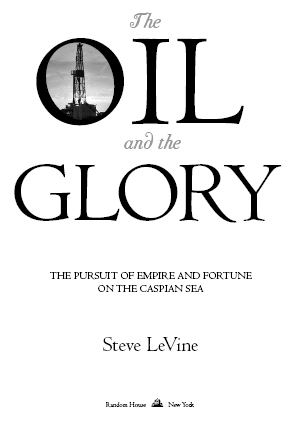
CONTENTS
To
Nurilda
PROLOGUE
THE FORBIDDING GEOGRAPHY SURROUNDING THE CASPIAN region of Central Asia and the Caucasus has long isolated it from the rest of the world. Situated between the Black Sea to the west and the Tien Shen mountains to the east, this is a vast land of sprawling deserts and jagged, nine-thousand-foot peaks, a bit more than half the size of the continental United States. In the center is the Caspian Sea, five times the size of the next largest inland body of water, Lake Superior.
Over the centuries, Russian novelists and British adventurers romanticized the region, with its camel fights, cacophony of languages, and magisterial kingdoms, known as khanates. But Russian soldiers seeking conquest sometimes became lost and desperate in its daunting wilderness, terrified of the Turkmen, Bukharan, or Chechen raiders whose knives and slave markets might await them. Because the region was so secluded, its exposure to the outside world was limited mostly to the march of conquering armies, starting with those of Alexander the Great more than 2,300 years ago. By the late-middle nineteenth century, its Armenian, Georgian, Persian, and Turkic-speaking Muslim peoples were under the rule of imperial Russia.
Always, there was oil. Marco Polo, the thirteenth-century Venetian trader, reported camel drivers exporting crude from Baku, the capital of Azerbaijan, to points as distant as Baghdad. It was valued both as an illuminant and a balm, he wrote, because in all the neighborhood no other oil is burnt. Petroleum deposits were so vast that oil and gas issued un-coaxed from the earth.
In 1872, czarist Russia loosened private land ownership rules in Baku, triggering a feverish oil boom there. At the turn of the century, Baku was providing more than half the worlds oil supply, outproducing even Rockefellers Standard Oil. Great fortunes were accumulated by the citys oil barons, who built imposing mansions and remade Baku into a European-style metropolis, resplendent at night under the glow of electric lights.
The 1917 Bolshevik Revolution claimed thousands of lives in Baku, destroyed its tycoons, and brought its golden age to an end. Oil production plummeted, wiping out Russias chief source of export dollars. Bakus decline mirrored the industrial paralysis that gripped all of Russia, a nation chronically unable to produce and innovate. Ever since Peter the Great, the Russians had attempted to compensate for this deficiency by importing foreign expertise. Now, his scorn for the West notwithstanding, Vladimir Lenin did the same.
American industrialists like Averell Harriman and Henry Ford answered the call, as did a scrappy New Yorker named Henry Mason Day, who revitalized the Baku oil industry with his state-of-the-art drilling technology. German, British, and other American companies followed Day into Baku, building new pipelines and refineries. The oil fields boomed. By 1928, production had recovered to its turn-of-the-century peak and Stalin was committing more money to spur further growth. So it went for decades, until Bakus oil production and the city itself once again slid into a deep decline. The grand old mansions decayed, and the city became a seedy backwater that stank of oil fumes and garbage.

O n December 26, 1991, the Soviet Union collapsed, and the Cold War came to an abrupt end. Fifteen new nations emerged from the wreckage, among them a cluster of states in the Caspian region with names so unfamiliar that few outsiders could spell or pronounce them. (Some foreigners dubbed them the Stans, since many of their names ended with that syllable.) Although these states were economic failures, together they were said to possess the worlds third-largest reserves of oil and natural gas, behind only the Persian Gulf and Siberia.
Thus began a new Caspian oil boom, one that would dwarf its nineteenth-century predecessor. Oilmen from America, Britain, Italy, France, Japan, China, and elsewhere scrambled to cut billion-dollar deals with the regions emerging strongmen. For a time, the Caspian was at the center of the greatest sale in the history of the world, as writers Daniel Yergin and Joseph Stanislaw described the period. It echoed the era immediately preceding the First World War, when American and European industrial titans struggled for power and raw economic dominance. The excitement that the Caspian triggered in the global halls of commerce called to mind the openings of the Suez and Panama canals. Western nations relished the prospect of becoming less dependent on Persian Gulf energy suppliers, whom Washington and London increasingly mistrusted. The Central Intelligence Agency fielded Caspian agents, and the U.S. Army trained local soldiers to keep pipelines safe from attack. (Even Hollywood got in on the act. Caspian pipeline intrigue provided the backdrop for the 1999 James Bond film The World Is Not Enough, and the CIA, Kazakhstan oil fields, and oil industry corruption drove the 2005 political thriller Syriana.)
Oil riches remade the two most important cities of the regionBaku, the Azeri port on the west side of the Caspian, and Almaty, the Kazakh business capital on the east side. New European restaurants and Turkish cafs flourished. Along Bakus faded promenade, Charlies Bar served American-style hamburgers, and well-dressed couples strolled at night past brightly lit cosmetics and clothing shops. Gamblers risked their oil fortunes in Bakus casinos, and onetime Soviet apparatchiks, flush with bribes, built luxurious homes and imported new Mercedeses. Kazakhstans president, Nursultan Nazarbayev, built an entirely new capital that resembled an upscale theme park.
But the sudden display of cosmopolitan wealth masked some ugly realities. The larger population remained mired in poverty; in time, the presidents of Azerbaijan and Kazakhstan would be named in U.S. money-laundering and corruption cases.
Fortune hunters and adventurers of all stripes flocked to the Caspian from throughout the West. Some were outright hustlers, like Viktor Kozeny, a smooth-talking Czech American with a Harvard economics degree who lured to his investment scheme former Senate majority leader George Mitchell and some of Wall Streets most seasoned financiers. Other pitchmen claimed that they could obtain the rights to the regions gold mines; before being unmasked, they managed to float stock issues in Toronto and London totaling $150 million. In both the Kozeny and gold mine deals, all the money was lost.
But the most intriguing players were the middlemenshrewd American and European dealmakers without whose blessings few foreign companies could gain access to an oil field. Some had flocked to the Soviet Union in the Gorbachev era, eager to participate in the profits they thought could be made from the newly legalized joint ventures between foreign companies and Soviet partners. But before the deals could get off the ground, the Soviet Union began to collapse all around them. Hungry for new opportunities, the boldest of these western entrepreneurs moved on to the former Soviet republics surrounding the Caspian, now independent nations. There they gained the confidence of the regions autocratic rulers, who asked them to protect the interests of the newly independent republics.
John Deuss, a Dutch oil trader with keen and ruthless instincts, was one such operator. He hobnobbed with Arab sheikhs and flew in a Gulfstream jet, often with beauteous models at his side, to visit his offices around the world. Frequently, he dispatched his jet to pick up employees or friends for a weekend at his Bermuda estate. In 1990, he had sent a team to the Soviet Union to look for promising ventures. That led to friendships with the leaders of Russia and Kazakhstan, relationships that he hoped to parlay into billions. In an especially nervy play, Deuss obtained exclusive rights to build a pipeline that would export oil from Kazakhstans biggest field, leaving its operator, Chevron Corporation, apoplectic and at his mercy.
Next pageFont size:
Interval:
Bookmark:
Similar books «The oil and the glory: the pursuit of empire and fortune on the Caspian Sea»
Look at similar books to The oil and the glory: the pursuit of empire and fortune on the Caspian Sea. We have selected literature similar in name and meaning in the hope of providing readers with more options to find new, interesting, not yet read works.
Discussion, reviews of the book The oil and the glory: the pursuit of empire and fortune on the Caspian Sea and just readers' own opinions. Leave your comments, write what you think about the work, its meaning or the main characters. Specify what exactly you liked and what you didn't like, and why you think so.


